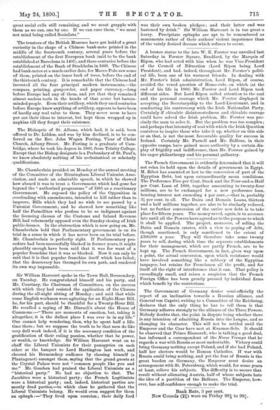Sir William Harcourt spoke in the Town Hall, Bermondsey, on
Tuesday. He congratulated himself and his party, and Mr. Courtney, the Chairman of Committees, on the success with which they had resisted the application of the Closure during the all-night sitting of Monday ; and said that while some English workmen were agitating for an Eight-Hour Bill, 'he, for his part, should be thankful for a Twenty-Hour Bill. He recalled a saying of Mr. Disraeli's about the House of Commons :—" There are moments of emotion, but, taking it altogether, it is the dullest place I was ever in in my life." One cannot help wondering, then, why he spent half a life- time there ; but we suppose the truth to be that men do like very dull work indeed, if it is the necessary condition of the gratification of their ruling passion, whether that be power, or wealth, or knowledge. Sir William Harcourt went on to chaff the Liberal Unionists for their panegyrics on each other at the banquet to Lord Hartington last week, and cheered his Bermondsey audience by classing himself (a Plantagenet) amongst them, saying that the grand guests at the Crystal Palace were not "common people like you and me." Mr. Gosehen had praised the Liberal Unionists as a "historical party." He had no objection to that. The Jacobites were a historical party; the French Legitimists were a historical party ; and, indeed, historical parties are mostly dead parties,—to which class he gathered that the Liberal Unionists belong. He would even suggest for them an epitaph :—" They lived upon coercion ; their daily food
was greir own broken pledges ; and their latter end was hastened by drink." Sir William Harcourt is in too great a hurry. Precipitate epitaphs are apt to be remembered OA monuments rather of their authors' violent impatience than of the vainly desired decease which refuses to occur.


































 Previous page
Previous page